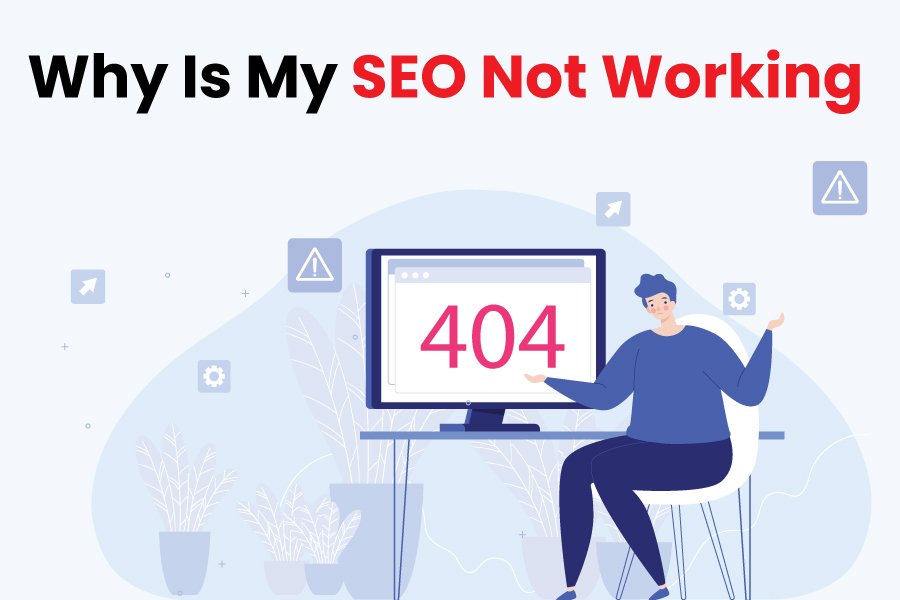
Why is my SEO not working after all the efforts and money invested? This can be frustrating. However, if you’re experiencing the same thing, don’t skip this post.
There are several reasons your SEO is not yielding results. We’ll discuss the reasons and how you can improve your website search engine optimization.
Firstly, the quality of the SEO agency managing your campaign matters a great deal. It will determine the quality of SEO services you’ll get. That is why I always advise businesses to outsource their SEO projects to a reputable company capable of delivering results, not excuses.
BitChip Digital is a leading SEO agency with specialists dedicated to helping businesses rank high and get more organic traffic. The company has a decent team of SEO professionals, willing to go the extra mile to get results.
Let’s focus on the reasons your SEO isn’t yielding results and steps you should take.
Why Is My SEO Not Working?
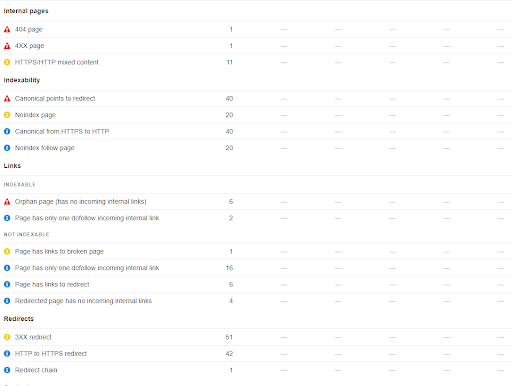
This question has no definite answer, as SEO is a complex process. Your SEO might not be working or yielding the desired results for several reasons.
The reasons could be poor SEO strategy, implementing the wrong SEO approach, performing DIY SEO with insufficient experience, or having high expectations that don’t match your level of investment or capabilities.
Another reason your SEO is not working could be the campaign’s duration. With SEO, it takes time to start seeing results. It can take weeks or even months. You can’t invest in SEO today and expect to rank #1 for your target keyword, the next day.
At BitChip Digital, we have been in the battle trenches, moving sites from zero ranking to the top of SERPs, taking the ones with a penalty to no penalty, and back to the top of SERPs. Here, we will explain why your SEO isn’t working and what you should do.
Can I Improve SEO That Is Not Working?
Yes, you can! However, you’ll require sound knowledge of search engine optimization best practices, experience, and the necessary tools.
SEO is dynamic, as search engines, especially Google, aren’t making life easier for website owners. Google updates its algorithm over 600 times yearly, almost twice daily.
So, if you want your SEO to work and plan on using DIY SEO, ensure you’re ready to update your knowledge regularly. In other words, you must learn about Google’s latest updates occasionally and how they impact your site’s ranking. It is a complicated and dicey task, but your SEO effort will yield results if done.
DIY SEO is advisable when you have the time, knowledge, skills, experience, and tools to do proper SEO. But if you don’t have these things and can’t hire an in-house SEO expert, outsource to a competent SEO agency.
You can improve SEO that isn’t working, though it’s not rocket science. You have to audit the website to uncover strategies that underperforming, the ones that are performing, and the specific metrics to work on.
Why Your SEO Isn’t Working And How To Fix Each Problem
Here, we’ll discuss why all your efforts to rank your site and boost organic traffic seem like a waste of time. You have done all you read or know about SEO, but nothing has worked.
What could be the problem? Let’s analyze the issues that can prevent your website SEO from producing results.
1: You hired a terrible SEO agency:
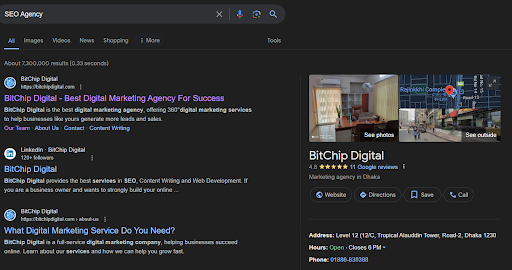
Even as a freelancer back then, I used to have clients who complained about spending big bucks on some popular SEO agencies, yet no tangible results to show for their investments.
It hurts hearing clients complain about entrusting their SEO campaign to an agency and even signing a long-term contract that yields no results. The worst part is the excuses some of these agencies give their clients. It’s terrible and frustrating.
Let me say this: if your SEO isn’t working, the SEO agency you entrusted with your project isn’t doing enough to make it work. It is possible that the agency doesn’t know much about SEO and lacks experience.
Another reason your SEO isn’t working is your business niche. You’re in a highly competitive niche, and the SEO agency handling your campaign doesn’t have the expertise to give you a competitive edge.
Hiring an SEO agency that’s below par can significantly impact your search results. Don’t expect a low-quality SEO agency to deliver a high-quality result.
A Handy Tip: I have stumbled upon individuals or so-called SEO experts claiming a business that hires an affordable SEO agency that charges less than $1,500 per month can’t achieve the same results as one that hires an SEO agency that charges $5000+ per month.
The thing is both agencies can deliver similar results. Sometimes, the less popular SEO agencies even do better because they are often less occupied and determined to succeed.
Most unpopular SEO agencies are more committed and ready to go the extra mile to get results. They want to make a name for themselves and have a team of dedicated SEO experts who are hungry for success.
That hunger for success drives most reputable, unpopular SEO agencies to show more commitment and go the extra mile to get results.
The fact that you’re paying $5000 per month to an SEO agency doesn’t mean you’ll get a better result from them than the ones charging less than $1,500. It is all about finding the right agency, willing to follow SEO best practices and do whatever it takes to get results.
2: Your SEO is not working because your campaign is fresh:
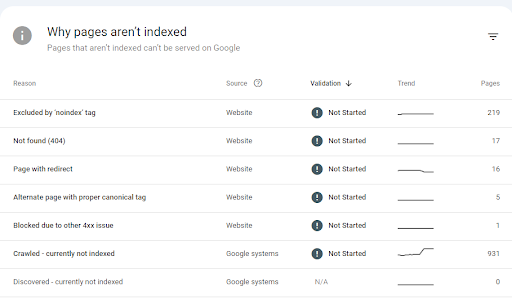
SEO takes time to yield results. Keep that in mind. If you start an SEO campaign today, it might take weeks or months to start seeing results.
So, if your SEO campaign is only a few weeks or days old, and you feel it’s not working, give it more time. You can start to raise an alarm or talk about your site’s SEO campaign not working after six months or a year.
3: Issues with your backlinks:
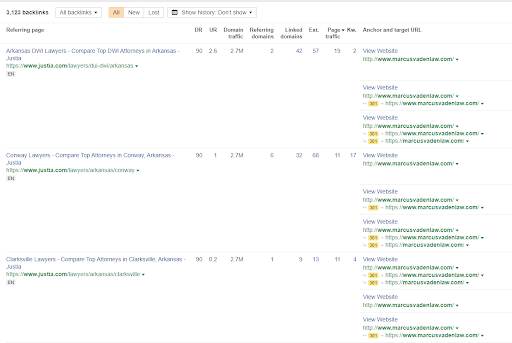
Backlinks are essential in any SEO campaign. They are not obsolete but rather will continue to be relevant.
Backlinks are one of Google’s major ranking factors. In other words, Google considers a page’s backlinks (and 200+ ranking factors) to determine a website’s ranking.
Now, how can backlink trouble affect your SEO?
If done incorrectly, backlinks could backfire. In other words, instead of ranking, you could drop further down after a Google Core Update.
How are backlinks done incorrectly? Aren’t all backlinks the same? No, all backlinks aren’t the same.
Case Study:
“In a project we did for one of our roofing clients who came to us to help improve his website ranking that has dropped, we did a complete SEO audit (checking the backlinks and others) and discovered that his website had a large amount of irrelevant and low-quality backlinks.”
Google doesn’t hesitate to penalize sites that fail to follow SEO best practices. So, there was no way our client’s site (with all the poor-quality and irrelevant backlinks it had acquired before we took over) would have escaped Google’s penalty.
Solution:
If you find yourself in such a situation, how do you fix the problem? Follow the steps below.
- Disavow low-quality backlinks: The first thing to do is audit your site’s backlink profile, identify the poor-quality backlinks, and disavow them. When you disavow, you stop the backlinks’ effect on your site. In other words, link juice from the site will no longer be passed to yours.
- Analyze your competitors: Another way to build links correctly is to analyze your competitors’ backlinks. Focus on the web pages outranking yours, and check the number and quality of backlinks pointing to the pages.
From this analysis, you’ll know the quality and number of backlinks you need to give your web page a better chance of outranking your competitors.
- Diversify your link sources: I am referring to obtaining your links from different platforms. Examples include blogs, listings, business directories, forums (Pinterest, Quora, Reddit, etc), reviews, etc.
- Balance the ratio of do-follow and no-follow backlinks: We all know do-follow links benefit a website’s ranking more as they pass on link juices. But that doesn’t mean no-follow links are not valuable. On the contrary, they are. No-follow links deliver referral traffic and can help you create brand awareness.
A Handy Tip: A healthy balance of do-follow and no-follow is essential for the success of your website. As a rule of thumb, aim for 60% do-follow and 40% no-follow backlinks.
- Referring domains’ quality: If you have hundreds of irrelevant backlinks, they won’t have a tangible impact on your ranking. Google cares more about the quality of your backlinks, focusing on the relevance and quality of the referring domain.
Links from sites that aren’t the same niche as yours will amount to nothing. In other words, Google won’t treat them as valuable backlinks.
So, consider the referring domains’ relevance and check their backlink profile to gauge their quality. If the site isn’t spammy and relevant to you, you’re good to go.
- Anchor text usage: Avoid using the same anchor text or using keyword-rich anchor text repeatedly. The anchor text strategy was one of the issues spotted in the roofing client’s website analysis.
A Handy Tip: Use different anchor texts that match the linked and linking page’s context and intent.
Finally, backlinks are crucial, and building a healthy backlink profile is important for the success of your website. But then, how you create the links matters, too.
You shouldn’t build hundreds of links simultaneously. Do it gradually. When you create links gradually, Google will assume you’re gaining popularity and reward you.
4: Unrealistic budget:

SEO is a long-term project, and long-term projects demand a long-term budget. Expecting to outrank your competitors who have been investing in their website’s SEO for years within a few months is unrealistic.
I am not saying it can’t happen. If your competitors apply the brakes on their SEO efforts and you continue making massive SEO efforts, it can.
Your SEO goals shouldn’t be to outrank your competitors tomorrow and quit investing in SEO. Your goal should be to invest in SEO consistently, even after outranking your competitors. Set futuristic goals.
If you plan to run the business for years and morph into something big, your SEO plans should be futuristic. If that’s the case, your business will have a promising future.
So, set a realistic SEO budget. First, find out the cost of the SEO agency’s premium services. For BitChip Digital, the premium service is the highest package and offers a wide range of SEO services tailored to help improve website ranking, traffic and more.
5: Terrible on-site optimization:
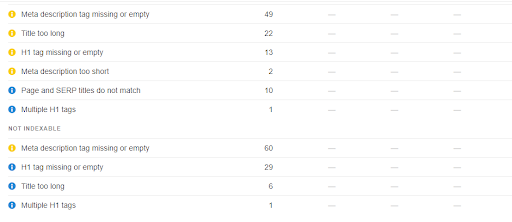
Your SEO is not working for plenty of reasons, and one could be your on-site optimization. You may have added multiple keywords to the content or failed to optimize it properly with your target keywords. These situations often happen when people perform DIY SEO without proper knowledge or hire an inexperienced SEO agency.
I have stumbled on home pages with the title “Home” still boldly written on the page. The website owner missed a clear opportunity to optimize the page.
On-site, also called on-page optimization, is relatively easy, though it is tricky for someone who isn’t conversant with the process. You must adhere to SEO best practices when optimizing your website. Avoid any temptation to break Google’s rules to prevent penalties or a situation where your SEO efforts would yield zero results.
Basic on-page search engine optimization is a simple task. It entails inserting your keywords in the page title and meta description. Let the target keyword blend with the sentence naturally.
When you optimize for relevance, you’ll increase your links’ chances of getting clicked. Additionally, ensure you include every detail about the services you render. Make it easy to understand so visitors seeking your products or services can make up their minds quickly.
6: Over-optimization could be the reason:

Over-optimization involves creating multiple SEO improvements to the point where those improvements start hurting the site. In other words, they will start limiting the site’s ability to rank high in search engines.
Have you ever encountered a website where the content doesn’t read smoothly? The text seems a bit off. Even the content structure isn’t well-organized.
On such websites, words like “in” and “to” are often missing from many sentences. Everyone who reads the content knows something isn’t right.
In some cases, you’ll find many keywords tucked into the footer or sidebar of these sites. Some of the pages look similar, except for the keywords.
Sites like these are usually over-optimized. Thus, no matter your SEO strategy and effort, they’ll never rank. The only way to fix the problem is to find an SEO expert to identify the issues via a thorough audit. The SEO expert will recommend a solution or implement a strategy to get your website back on track.
A Handy Tip: Over-optimization is no longer as it was. Remember, I said, SEO is dynamic. Things change regularly.
So, over-optimization is only part of your on-site optimization practice. It includes other areas like:
- Inbound links and anchor text
- Outbound links and anchor text
- Internal link and anchor text
- Meta description and page title
- Over-optimization of your website content
- Placing keywords unnaturally in the sidebar or footer area of your website
These are part of the over-optimization processes that can negatively affect your SEO. They can make it hard for your website to rank in search engines for your targeted keywords.
Keyword stuffing, which includes placing the same keyword in the content multiple times, can hurt your SEO effort. It is against Google’s rules. Keyword stuffing is an old strategy that doesnt yield results. It is one of the SEO strategies Google is strongly against.
7: Ignored technical SEO problem:
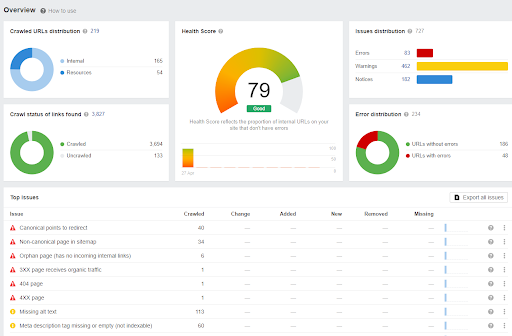
Another reason your SEO isn’t working could be technical SEO issues you forgot to address or considered irrelevant. Unfortunately, no technical SEO issue is irrelevant. All of them can negatively affect your website’s ranking.
Besides on-site and off-site optimization (e.g., link-building), technical SEO is another important aspect or one of the pillars of SEO.
Google considers some of the technical SEO areas of a website to be a ranking factor. So, you need to identify and fix your technical issues with your website. Otherwise, your SEO strategy and effort won’t yield results.
Technical SEO issues don’t always arise, except when you update your site. But that doesn’t mean you shouldn’t check for technical SEO issues when you can.
Below are technical SEO problems that can hinder your site’s ranking potential and cause your SEO not to work.
- Website load time: Google wants websites to load as quickly as half a second. It wants your website to load fast. Website load speed is a major Google ranking factor, so your SEO strategy and effort will only yield results when your website loads fast on desktop and mobile devices.
- Mobile-friendliness: There are currently more mobile phones than people in the world. So, tell me why mobile-friendliness will not be important. Google rolled out its mobile-friendly update on April 21, 2015, indicating that mobile-friendliness was a ranking factor.
A Handy Tip: Mobile-friendliness considers how your website loads on mobile phones. All mobile phones! A mobile-friendly website should load on mobile phones the same way it displays on desktops. Readers don’t have to zoom in or strain their eyes to read the website content on a mobile phone.
If your site isn’t mobile-friendly, there is no way your SEO efforts will yield results. Google appreciates sites that are mobile-friendly. It won’t penalize those who aren’t, but it will demote them on search result pages.
- Meta tag issue: Proper optimization of your meta tags is important for SEO. It will improve your click-through rates, indexing, and relevance in search engines.
- 404 errors: Is your site displaying 410 (gone) or 404 (page not found) errors? Then, it has a technical SEO problem you need to fix. These errors can lead to organic traffic loss and poor user experience, negatively affecting your ranking.
Never ignore any technical SEO issue, as it can negatively impact your site. Keep an eye on Google search console and fix any technical problems with your SEO to boost your site’s ranking potential.
8: You don’t monitor your site’s SEO:
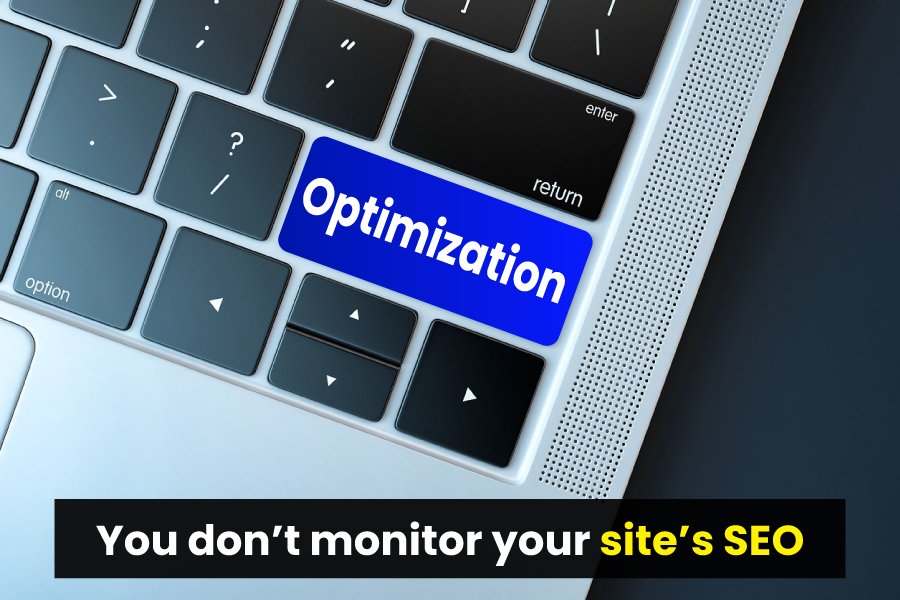
If you’re desperate to know why my SEO is not working, your inability to monitor your SEO performance could be the reason.
Understand that not all strategies work for certain websites or niches. In other words, an SEO strategy that yielded results for website (A) might yield different results for website (B). That is the point.
When you monitor and track your SEO performance, you’ll discover strategies that work and those that aren’t. This way, you can channel more effort into the strategies yielding the best results while focusing on ways to improve the others. You won’t waste your time on efforts that won’t yield results.
Conclusion
So, why is my search marketing campaign not working? You can now understand why. We have discussed several reasons your website’s SEO campaign efforts aren’t yielding the desired results. The problem could be technical SEO issues, poor optimization or over-optimization, terrible backlinks, or the campaign’s duration.
Another major reason we have observed over the years is the SEO agency handling your campaign. An agency that lacks proper knowledge or experience in SEO will have issues executing an effective SEO strategy, especially in highly competitive niches.
